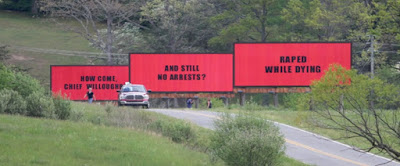A forgotten film, but I've never forgotten it, and I doubt anyone who's seen it has forgotten it. Long before her "Scarlet Witch" days, it marked the "break out" role of Elizabeth Olsen.
Written at the time of the film's release.

Cult Film
or
"Freedom's Just Another Word for Nothing Left to Lose"
Martha Marcy May Marlene has gotten a lot of press, mostly for the starring performance of the non-twin Olsen sister, Elizabeth (she really is quite good in it, her film debut), but the film has a lot to show besides being fodder for the tabloids. A slowly unfolding paranoid thriller, the first feature of writer-director Sean Durkin, you wonder exactly where it's going and where it's leading—if anywhere.
It keeps you guessing—the very same predicament of almost every character in the film. The film opens on an idyllic farm community...commune, more appropriately...in the Catskills, as the members busy themselves, mending fences, tending crops, while the children meander. Bucolic, it looks. Slightly rustic and hippieish, it feels. Then, at dinner-time, the women wait in the kitchen while the men eat...first...and they only eat when they've had their fill. Slightly odd, slightly misogynistic, but one gets the impression that it's a male-centered, maybe religious community, just the slightest sense of unease.
It's how Durkin operates. No one comes right out and says anything. Characters don't come out and say "This is this and that is that." We, the audience are allowed to observe and ponder—to notice when things turn slightly askew and, in the time-compressed world of the movies that happens fairly quickly, but at a slower pace than most mainstream movies. Like the happenstances of those of the film, things go along normally until it suddenly dawns on us—something's wrong here.Early on, Marcy May (Elizabeth Olsen) awakens at night, and softly skulks out of the main house, where the women all sleep in one room. She goes out the front door, and we notice one of the women is awake and watching her from inside. Marcy walks across the lawn to the street separating their farm from the woods...and then, she breaks into a run, mad, desperate and hides amidst the collapsed trunks of dead trees while the house empties of men and women who run through the woods, looking for her. It's as creepy as a zombie movie. Eventually, she makes it to a telephone, where, crying, desperate, she calls a woman who is amazed to at the call. She hasn't heard from her for two years. "Tell me where you are and I'll come get you right now." And soon, an SUV pulls up. A woman gets out. And Marcy May...or Martha, as the woman calls her...collapses in her arms. It's Martha's sister, Lucy (Sarah Paulson) who's found her, and who asks questions, but gets no answers. Where's Martha been? Where'd she go? Is she alright? What happened? Why didn't she try to contact her before? Martha hems and haws and says something about a cheating boyfriend, but never goes into detail. And nothing is pressed. Martha sleeps. Lucy and her husband Ted (Hugh Dancy) pad softly around their posh lake-house, trying to make Martha at home, but also wondering why she's acting so diffidently, cluelessly, not revealing much. It causes a strain in Lucy and Ted's domestic bliss—they want to have a family, but a well-ordered one (good luck with that, kids!) and Martha is a square peg in their round lifestyle. What's got into her, anyway? She skinny-dips in the lake (ferchrist'ssake!) with all the neighbors around (and I'm sure there's a covenant against that!), wears the same worn jean shorts and shirt from her escape day after day, cleans incessantly, doesn't try to find a job, and seems to be constantly wrestling with the "fight-or-flight" instinct. They don't know about the flash-backs. Durkin builds the story of Marcy May's life, while at the same time showing the breakdown of her time with her sister. Early on, we're given the sense that there's some push me-pull you occurring: the farm has an odd, creepy malevolence to it—there's a sense of freedom there, of good leftist values, all macrobiotic and natural with shared living spaces, shared clothes and a general lack of possessiveness. It contrasts sharply with Lucy and Ted's tight-ass lifestyle, neat as a pin and dead as a door-nail. You start to compare and contrast—where would Martha (or Marcy May) be better off? Where is freedom, that is "real" freedom, to be oneself, in either world that Martha (or Marcy May) has inhabited? That's the first 30 minutes or so of the film.
And then, things turn ugly.
And very interesting, much to the presence of newly ubiquitous utility-character-actor John Hawkes (who has developed a habit of subtly inhabiting roles of such wide range with such economy that I'm starting to think he's in a class by himself in the acting field). As Patrick, the pater-too-familias of the commune, he projects a creepy sense of calm manipulation that as the movie goes further turns dark and menacing. It's not in the manner, but in the words, which Hawkes sells in the same calm talk, that in the worst of times turns into icy silences. Hawkes is just plain Good, whether he's playing good or bad. I recommend this one. It's subtle, tense and troubling with no easy answers and the momentum of water circling in a drain to an inevitable conclusion (which we never see) that we know is coming. It's occasionally raw and as comforting as sandpaper. It's not for the complacent movie-goer, but it's a damn interesting film (not only in the skewering of thriller cliches but also in the subtle points its trying to make) and an even more impressive debut, not only for Ms. Olsen, but also for its writer-director.






























